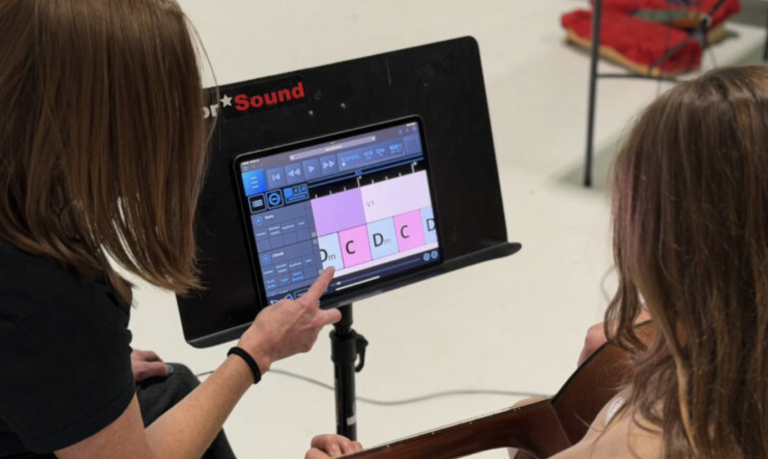
Finding the right study music can be a game changer for your focus and productivity. With so many options out there, it can be tough to know what works best. Luckily, research shows that certain types of music can really help boost your concentration and make studying less stressful. This guide will walk you through the science behind study music, its benefits, and how to create the perfect playlist to help you reach your goals.
Key Takeaways
- Music can boost your cognitive abilities and enhance your focus while studying.
- Genres like classical, ambient, and lo-fi hip-hop are great for improving concentration.
- Instrumental tracks and nature sounds can help reduce stress and create a better study environment.
- Different people benefit from study music in various ways, including students and professionals.
- Experimenting with volume and different genres can help you find what works best for your study sessions.
Understanding The Science Behind Study Music
How Music Influences Cognitive Function
Okay, so, how does music actually affect your brain when you’re trying to study? It’s not just some random thing people say. Certain types of music can really impact your cognitive abilities. Think of it like this: your brain is a complex machine, and music can be a tool to fine-tune it. The right tunes can help minimize distractions and create a better mental state for learning. It’s all about finding the right frequency, literally and figuratively.
The Role of Rhythm and Tempo
Rhythm and tempo are super important. A fast, chaotic beat? Probably not great for focusing. But a steady, moderate tempo? That might be just what you need. Studies have shown that music with a tempo similar to your resting heart rate can be particularly effective. It helps create a sense of calm and focus, allowing you to concentrate better. It’s like your brain is syncing up with the music, leading to improved concentration. You can boost cognitive function by listening to music with a tempo of around 60 beats per minute.
Music and Memory Retention
Music can also play a role in memory retention. It’s not just about blocking out distractions; it’s about creating associations. When you listen to certain music while studying, you might find it easier to recall that information later when you hear the same music. It’s like your brain is tagging the information with the music, making it easier to retrieve. Think of it as a mental shortcut. It’s not a magic bullet, but it can definitely help.
I’ve found that listening to the same playlist while studying for a specific exam helps me recall the information more easily during the test. It’s like the music acts as a trigger, bringing back the concepts I learned while listening to it.
Benefits Of Listening To Music While Studying
Music can really change the game when you’re trying to hit the books. It’s not just about having something on in the background; it can actually make studying easier and more effective. Let’s look at some of the ways music can help you out.
Elevates Mood And Motivation
Listening to music can make you feel good, and that’s a big deal when you’re facing a tough study session. A positive mindset can pave the way for enhanced focus and better absorption of information. When you’re in a better mood, you’re more likely to stay motivated and keep going, even when things get difficult. Think of it as a little boost to help you power through. If you need additional guidance on forming positive study habits, check out Learning How to Learn.
Reduces Stress And Anxiety
Studying can be stressful, no doubt about it. But music can be a great way to chill out and lower those stress levels. Soothing music can help reduce cortisol levels, which is the body’s stress hormone. When you’re less stressed, you can think more clearly and remember things better. It’s like hitting the reset button on your brain, so you can focus on what matters.
Enhances Focus And Concentration
It might sound counterintuitive, but music can actually help you focus. The right kind of music can block out distractions and create a bubble of concentration around you. It’s not about just hearing noise; it’s about finding music that helps you stay in the zone and really dig into your work. If you are looking for a wide range of material, check out Library.
Music can be a powerful tool for creating the right study environment. It’s about finding what works for you and using it to your advantage. Experiment with different genres and see what helps you stay focused and motivated. Just remember to listen to your body and take breaks when you need them.
Best Genres Of Music For Focus And Concentration

When you’re trying to really focus, the type of music you listen to can make a big difference. Some genres are just better at helping you concentrate than others. It’s not just about personal preference; some sounds have properties that can actually help your brain get in the zone. Let’s explore some top contenders.
Classical Music
Classical music is a classic choice (no pun intended!) for a reason. The intricate structures and harmonies found in classical pieces can be super engaging for your brain. Think about composers like Bach, Mozart, and Beethoven. Their music isn’t just pretty; it can actually help boost your cognitive functions. Some studies even suggest that listening to classical music can temporarily improve spatial-temporal reasoning. It’s worth giving it a shot if you need to buckle down and get some serious work done. It can be a great focus-enhancing tune.
Ambient Sounds
If melodies and harmonies aren’t your thing, ambient music might be more up your alley. This genre is all about creating a calming atmosphere without being too distracting. Ambient tracks often feature soothing sounds like water, wind, or soft instrumental textures. The goal is to create a tranquil soundscape that helps reduce stress and anxiety, making it easier to concentrate on complex tasks. It’s like a gentle background hum that keeps you grounded without pulling your attention away. I find that it helps me to stay calm and focused, especially when I’m feeling overwhelmed.
Lo-Fi Hip-Hop
Lo-fi hip-hop has become incredibly popular among students and young professionals, and for good reason. It combines simple, repetitive beats with mellow melodies to create a relaxing yet subtly stimulating listening experience. The gentle loops and rhythmic beats provide a consistent background that can help drown out distractions without being intrusive. It’s the kind of music that you can put on and forget about, allowing you to sink into your work without getting bored or sidetracked. It’s perfect for those long study sessions or late-night work sprints. It’s a great way to create a cozy, laid-back environment.
Finding the right study music is a personal journey. What works for one person might not work for another. The key is to experiment with different genres and find what helps you stay focused and productive. Don’t be afraid to try new things and see what resonates with you.
Creating The Perfect Study Music Playlist
So, you’re ready to build the ultimate study playlist? Awesome! It’s not just about throwing a bunch of songs together; it’s about crafting an experience that keeps you focused and productive. Think of it as your secret weapon against procrastination. Let’s get into the nitty-gritty.
Choosing Instrumental Tracks
Lyrics can be super distracting when you’re trying to absorb complex information. Seriously, who can focus on calculus when Beyoncé is telling you to get in formation? Instrumental tracks are the way to go. They provide a rhythmic background without the lyrical interruptions. Consider genres like classical, ambient, or even instrumental versions of your favorite pop songs. It’s all about finding that sweet spot where the music supports your focus, not steals it. For example, you can find classical radio on Pandora.
Incorporating Nature Sounds
Don’t underestimate the power of nature! Seriously, sometimes the best "music" isn’t music at all. The gentle sounds of rain, a babbling brook, or even crickets chirping can do wonders for your concentration. Nature sounds can reduce stress and create a calming atmosphere, perfect for those intense study sessions. You can find plenty of nature sound playlists on streaming services or even dedicated apps. I find that a mix of rain and distant thunder really helps me zone in. It’s like a mini-vacation for your ears, and who doesn’t need that when staring at textbooks all day?
Avoiding Distracting Lyrics
This one seems obvious, but it’s worth repeating: avoid distracting lyrics! Even if you think you can tune them out, your brain is still processing them. This can lead to mental fatigue and decreased focus. If you absolutely must listen to music with lyrics, choose something in a language you don’t understand. That way, it just becomes another instrumental layer. Or, better yet, stick to instrumental tracks. Trust me, your brain will thank you. You can also try Chillhop Music for a lyric-free experience.
Creating the perfect study playlist is a personal journey. What works for one person might be a total disaster for another. Experiment with different genres, tempos, and soundscapes until you find the combination that helps you achieve peak focus and productivity. Don’t be afraid to ditch songs that aren’t working, and always be on the lookout for new additions to your playlist.
Who Benefits From Productivity Playlists
Productivity playlists aren’t just for one type of person. They’re surprisingly versatile and can be a game-changer for anyone looking to boost their focus and get more done. Let’s look at some key groups who can really benefit.
Students
For students, juggling classes, assignments, and exams can be super stressful. Productivity playlists can be a lifesaver for maintaining concentration during those long study sessions. Think about it: a curated playlist can help minimize distractions, making it easier to absorb information and stay on task. It’s like having a personal focus assistant!
Professionals
In the professional world, the pressure to be productive is always on. Whether you’re working from home or in a busy office, productivity playlists can help create a focused environment. They can be especially useful for tasks that require deep concentration or for blocking out distracting office noise. It’s a simple way to enhance focus and efficiency throughout the workday.
Creative Individuals
Creative work often requires a delicate balance of focus and inspiration. Productivity playlists can help creative individuals tap into their flow state by providing a consistent and non-distracting auditory backdrop. Instrumental music, ambient sounds, or even carefully selected electronic tracks can help spark creativity and keep those creative juices flowing. It’s all about finding the right study music to set the mood and get those ideas flowing.
Productivity playlists can be a great tool, but it’s important to remember that everyone’s different. What works for one person might not work for another. Experimenting with different genres, tempos, and styles is key to finding what helps you focus and be your most productive self.
Tips For Maximizing Study Music Effectiveness

Experimenting With Different Genres
Don’t get stuck thinking only one type of music works. The best way to find your ideal study music is to try different genres and see what clicks. What works for your friend might not work for you. Maybe classical music bores you, but lo-fi hip-hop keeps you in the zone. Or perhaps ambient sounds are your thing. Give everything a shot! You might be surprised at what you discover.
Setting The Right Volume
Volume is key. Too loud, and it’s distracting. Too quiet, and you might as well not have it on. You want the music to be a background element, not the main focus. A good rule of thumb is to set the volume low enough that you can still easily hear yourself think. Experiment with different levels to find what works best for you. I find that a consistent, moderate volume helps me maintain sustained focus without being intrusive.
Timing Your Music Usage
Music isn’t a magic bullet for studying. It’s a tool, and like any tool, it’s most effective when used correctly. Consider when you’re using music. Is it for focused work, or just to get you in the mood to start? Maybe you only use it for certain subjects. Also, think about breaks. Don’t listen to music non-stop. Give your ears (and brain) a rest.
I’ve found that using music strategically is way more effective than just having it on all the time. I usually start with music to get motivated, then turn it off when I need to really concentrate on something complex. Taking short breaks without music helps me reset and come back refreshed.
Here’s a simple breakdown of how I time my music:
- Warm-up (15 mins): Upbeat music to get energized.
- Focused Work (45 mins): Instrumental or ambient music.
- Break (15 mins): No music, complete silence.
- Repeat: Adjust times as needed.
Common Misconceptions About Study Music
It’s easy to fall for common beliefs about study music, but let’s clear up some misconceptions. Not everything you hear is true, and what works for one person might not work for another. It’s all about finding what helps you focus.
Music Is Always Distracting
This is a big one! While it’s true that music can be distracting, especially if it’s too loud or has lyrics, it’s not always the case. For many, music actually helps to block out other distractions and create a more focused environment. Think of it as a tool – when used correctly, it can be incredibly beneficial. Some people find that certain types of music, like ambient or instrumental tracks, help them concentrate by providing a consistent, non-intrusive background noise. It really depends on the person and the type of task at hand. For example, when diving into preclinical content, some background music can be helpful.
Only Classical Music Works
Classical music often gets touted as the ultimate study music, thanks to the supposed "Mozart Effect." While classical music can be great for some, it’s definitely not the only option. The best music for studying is really subjective. Some people might prefer electronic music, others might like nature sounds, and some might even find that lo-fi hip-hop helps them concentrate. The key is to experiment and find what works best for you. Don’t feel pressured to listen to classical music just because it’s what everyone else recommends.
All Music Is Beneficial
Not all music is created equal when it comes to studying. While some music can help you focus, other types can be incredibly distracting. Music with lyrics, for example, can often pull your attention away from your work, especially if you’re trying to read or write. Similarly, music with a fast tempo or a lot of changes can be too stimulating and make it hard to concentrate. It’s important to choose your music carefully and be mindful of how it’s affecting your focus. If you find yourself singing along or tapping your foot instead of working, it’s probably time to switch to something else. It’s also a good idea to explore music theory to understand how music affects your focus.
It’s important to remember that everyone is different, and what works for one person might not work for another. The key is to experiment with different types of music and find what helps you focus and be productive. Don’t be afraid to try new things and see what works best for you. And don’t get discouraged if you don’t find the perfect study music right away – it might take some time and effort to find what you’re looking for.
Wrapping It Up: Your Soundtrack to Success
So, there you have it. Music can really change the game when it comes to studying and getting things done. Whether you’re hitting the books for an exam or tackling a big project at work, the right tunes can help you focus and keep distractions at bay. Remember to try out different genres and see what works best for you. Maybe it’s classical, or perhaps some chill lo-fi beats. Whatever it is, make it your own. Just don’t forget to keep it instrumental if lyrics tend to pull your attention away. With a solid playlist, you’ll find yourself more productive and less stressed. So go ahead, create that perfect study soundtrack, and watch your productivity soar!
Frequently Asked Questions
What type of music is best for studying?
Genres like classical, ambient, and lo-fi hip-hop are great for studying because they help you focus without being distracting.
Can listening to music really help me study better?
Yes! Music can boost your mood, reduce stress, and improve concentration, making it easier to learn.
Should I listen to music with lyrics while studying?
It’s better to avoid music with lyrics. Instrumental tracks are less distracting and help you concentrate more.
How loud should I play my study music?
Keep the volume at a comfortable level. It should be loud enough to hear but not so loud that it distracts you.
Is it okay to change my study music often?
Absolutely! Experimenting with different types of music can help you find what works best for you.
Do all students benefit from study music?
Not everyone responds the same way to music. Some students find it helpful, while others may prefer silence.








